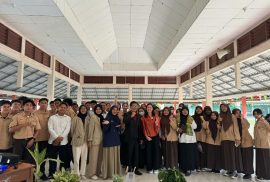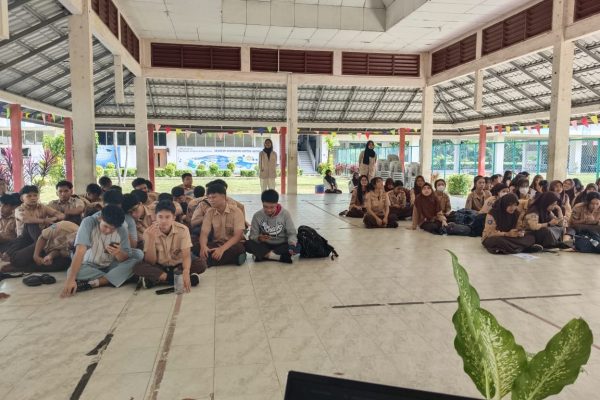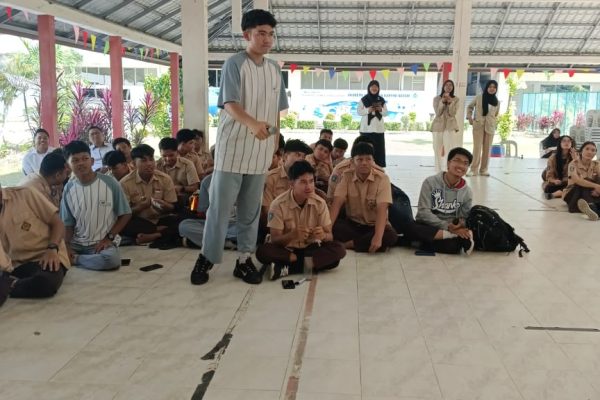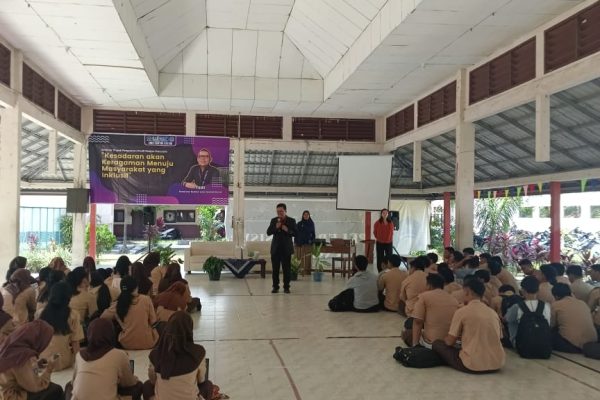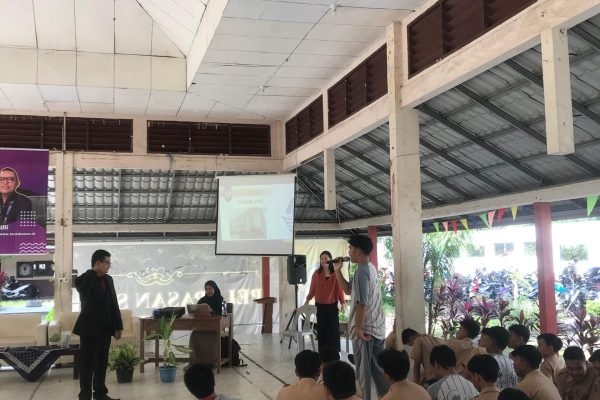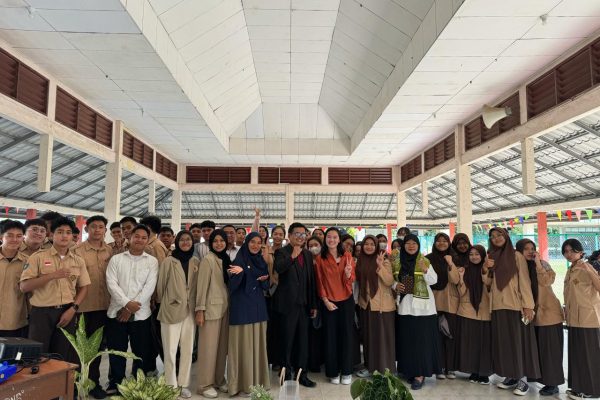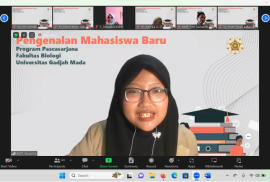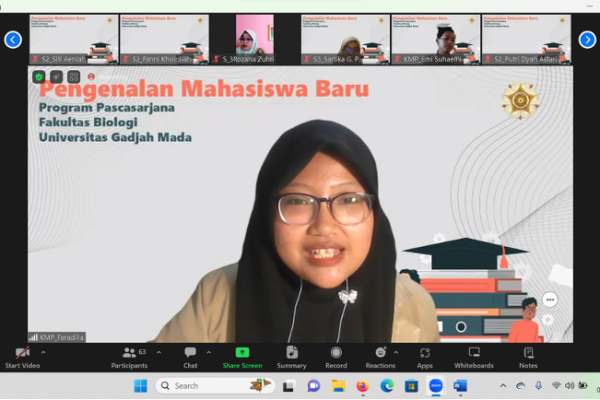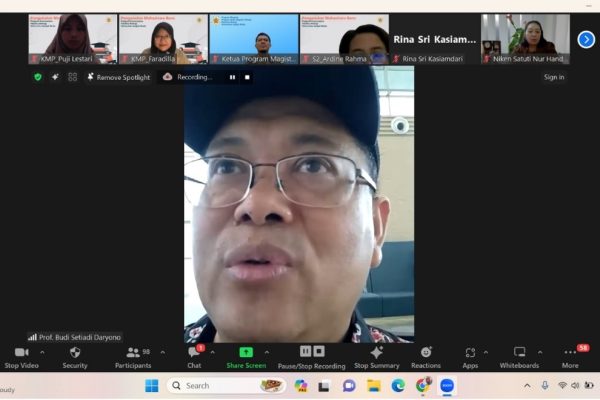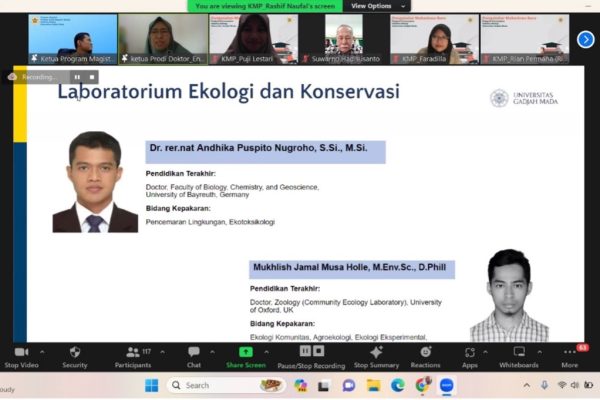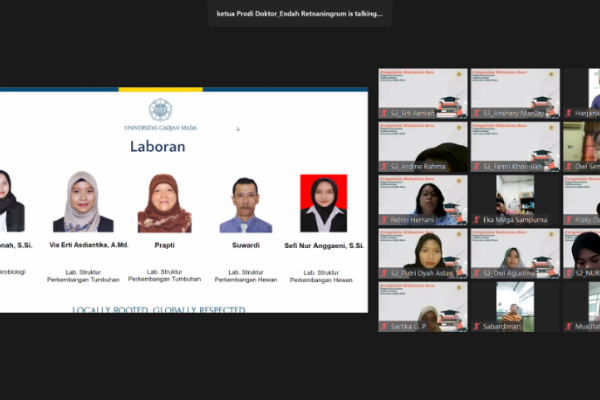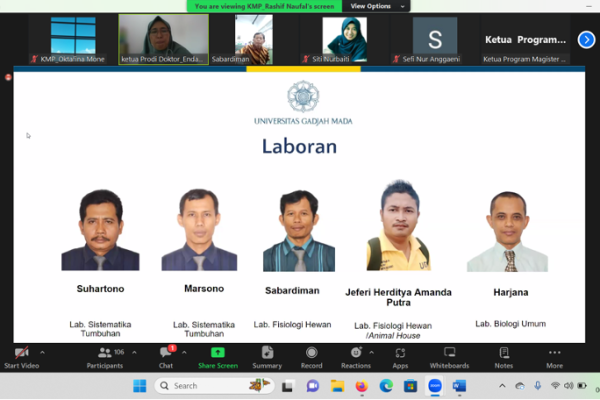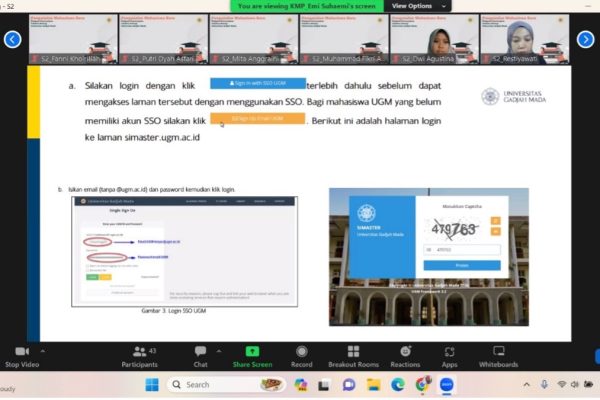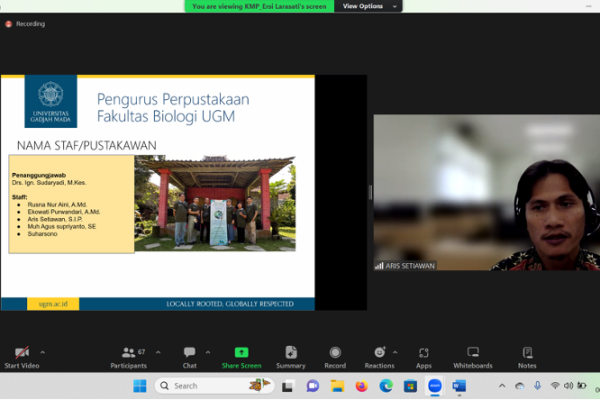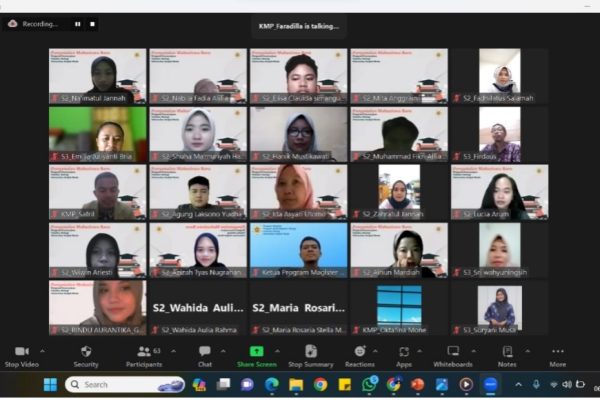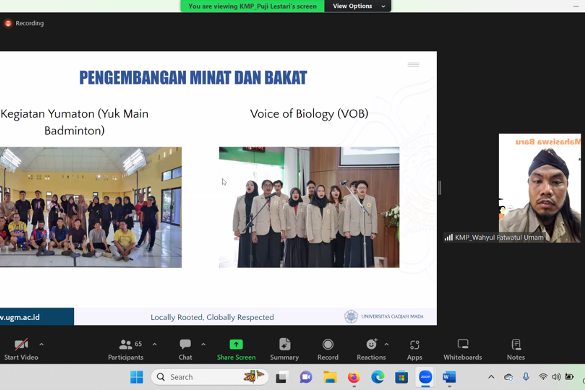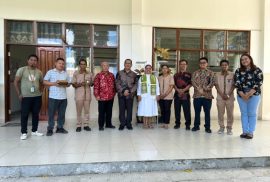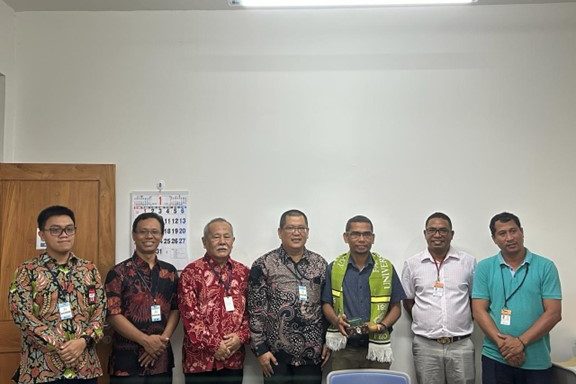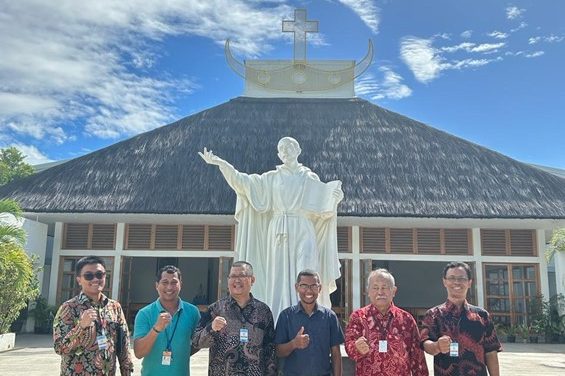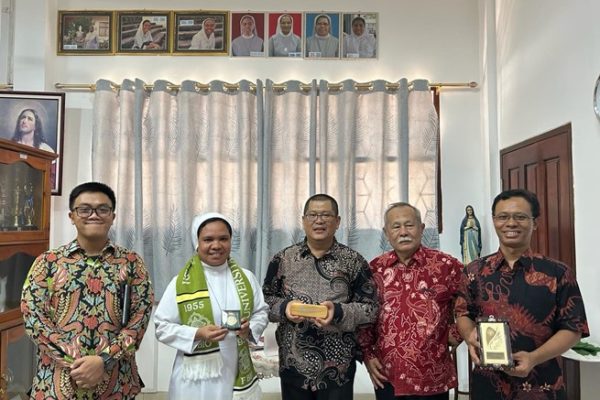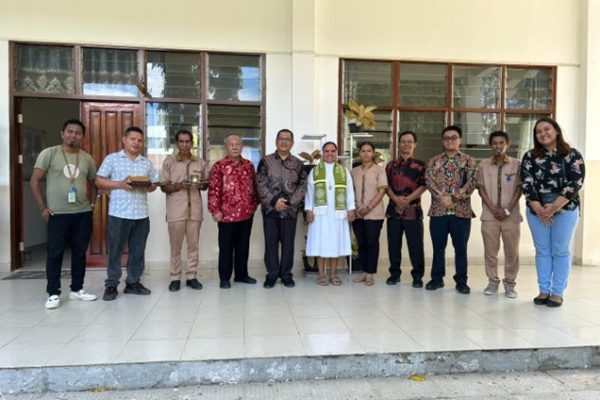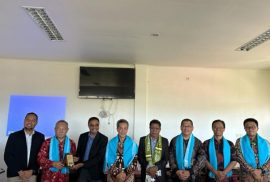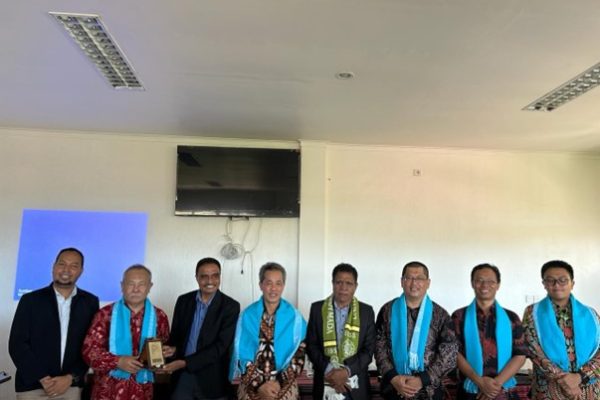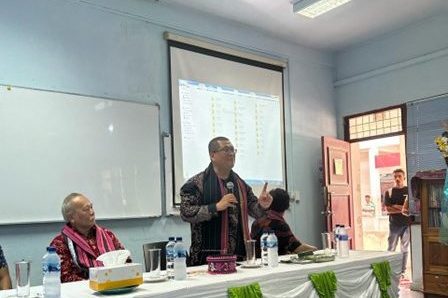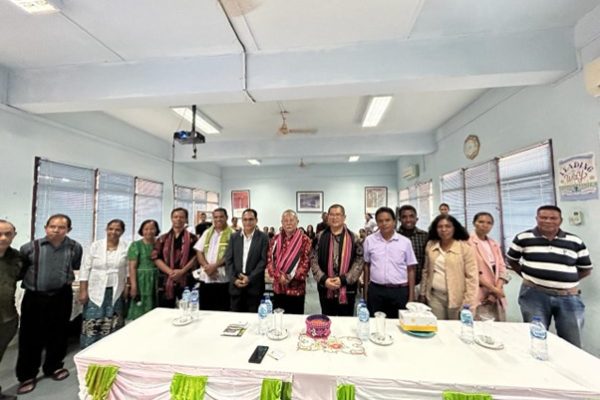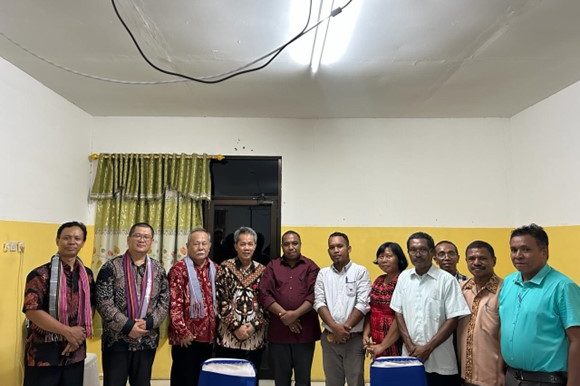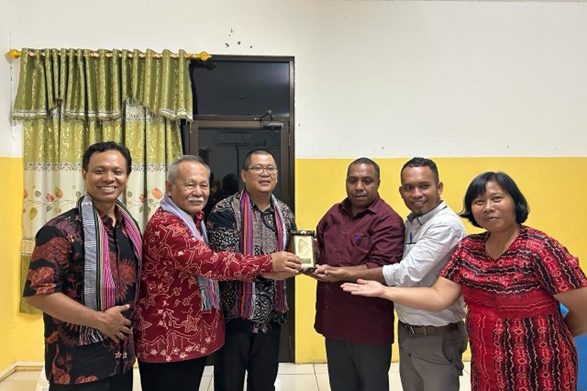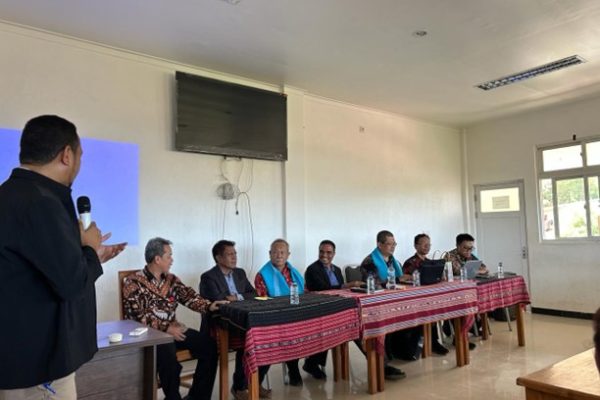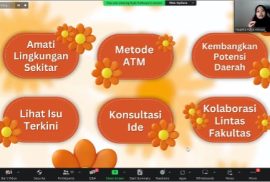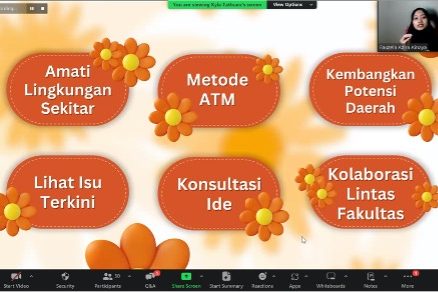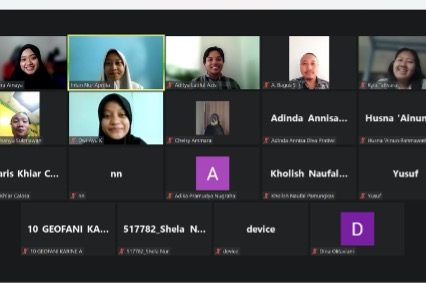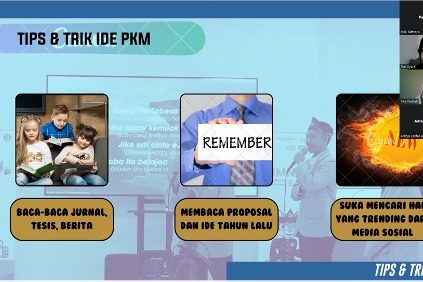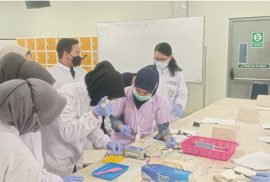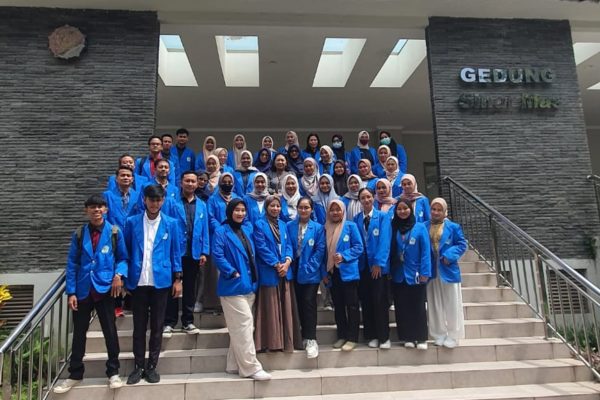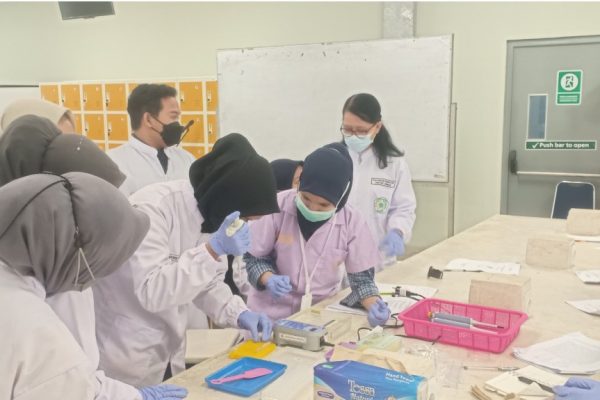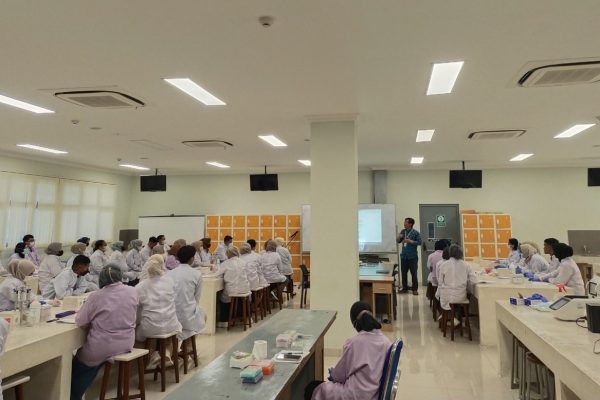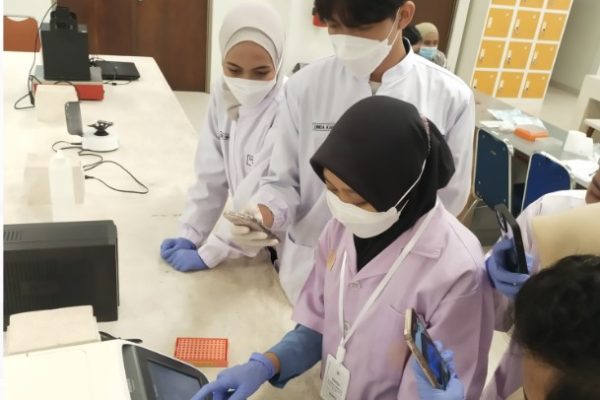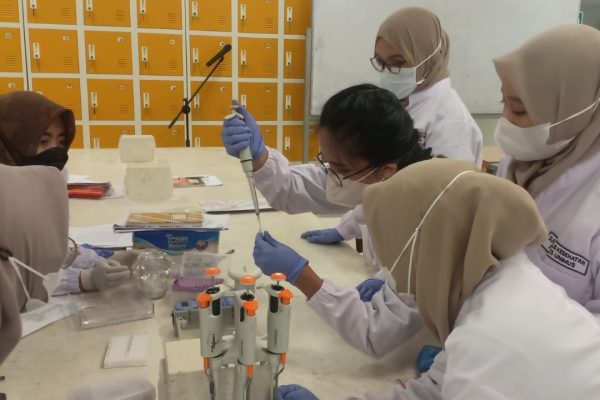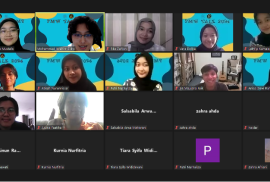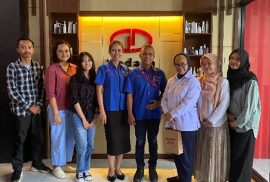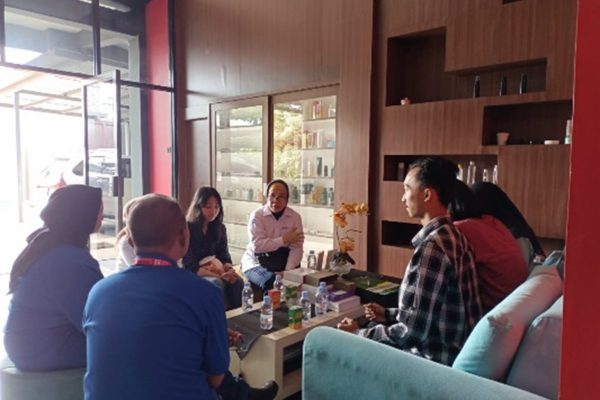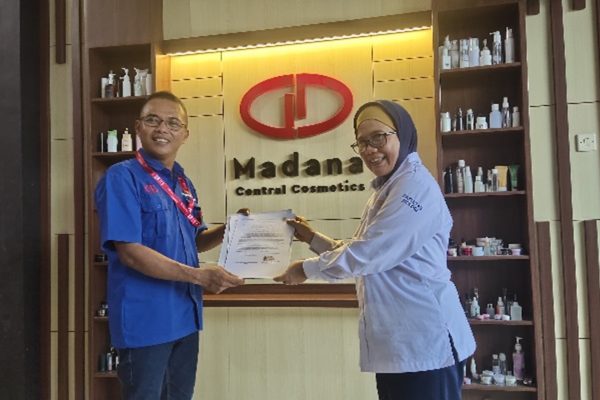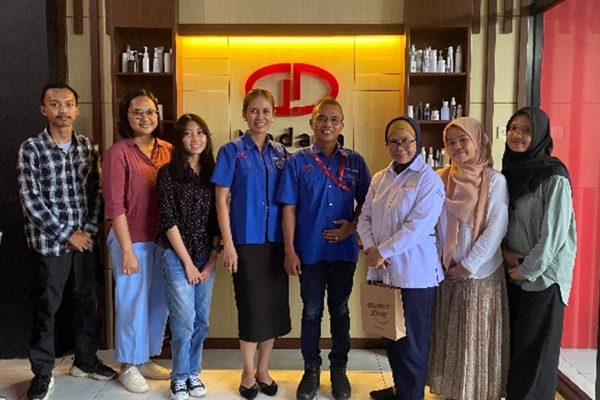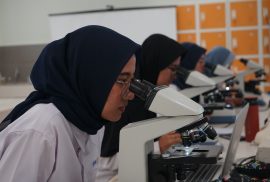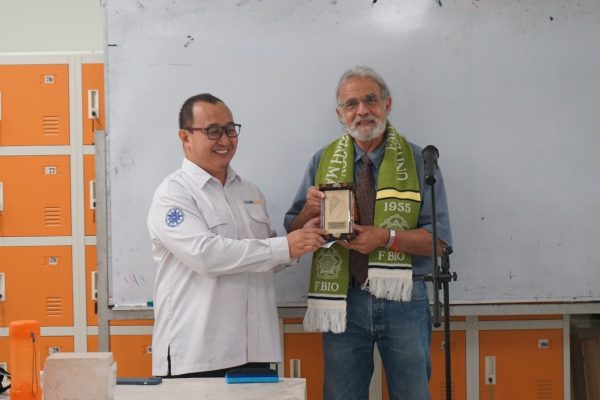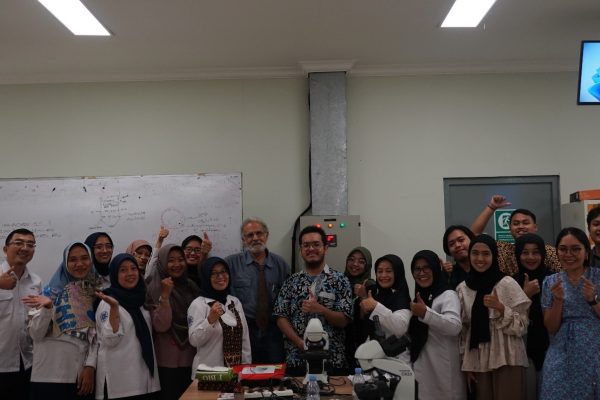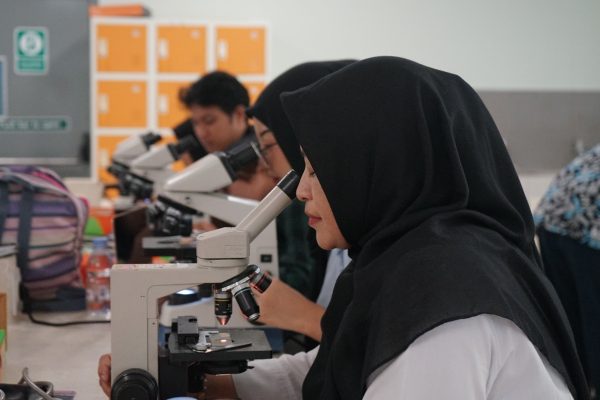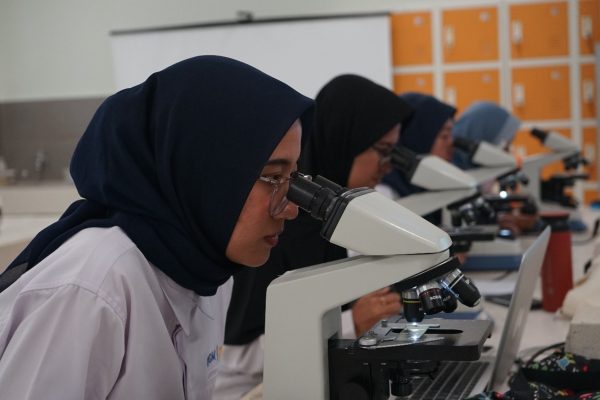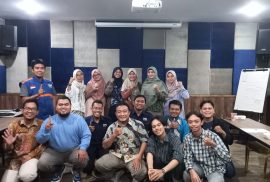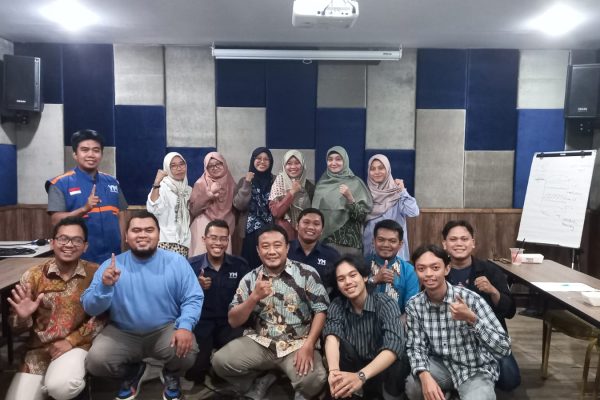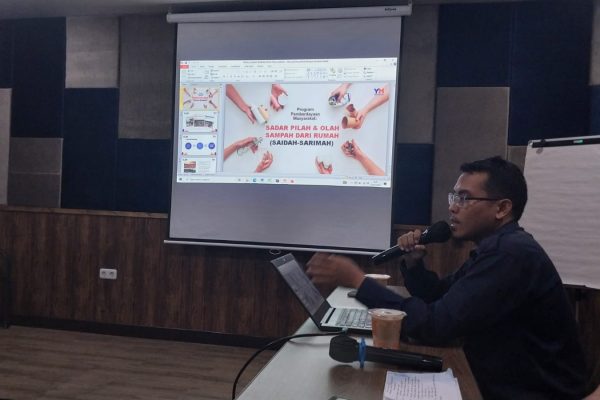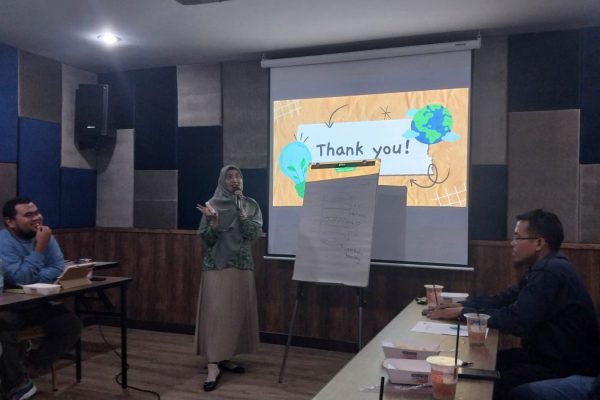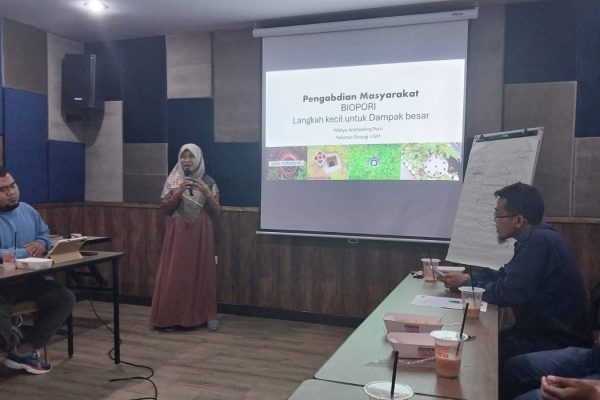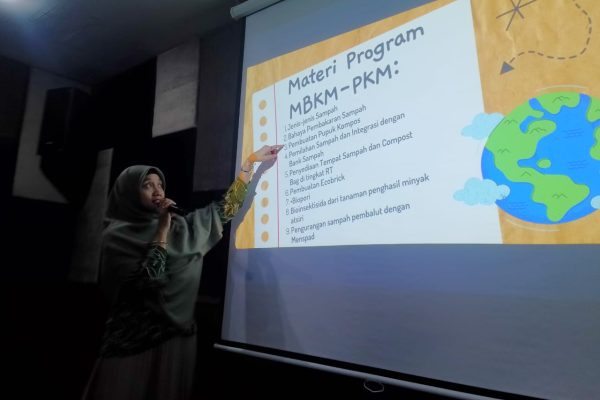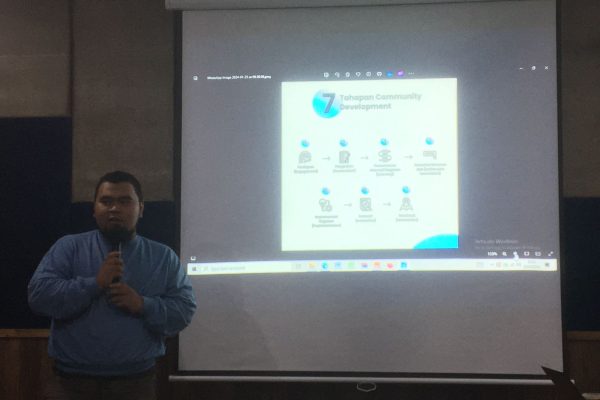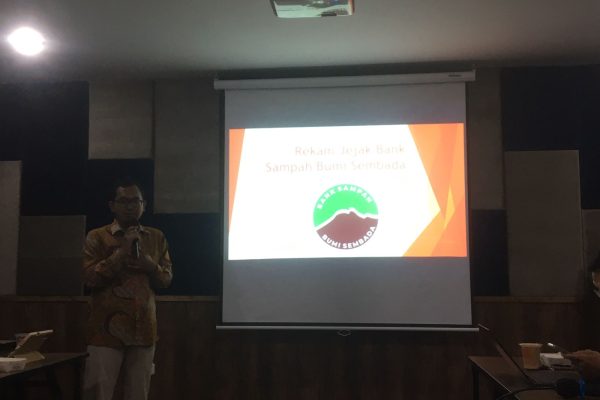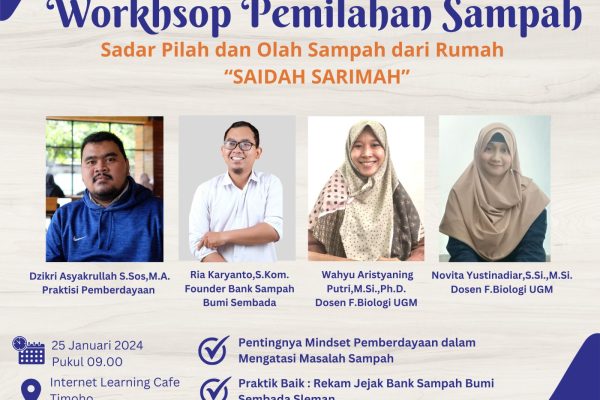Batam, February 7, 2024 – SMA Kartini Batam warmly welcomed a team from the Faculty of Biology, Universitas Gadjah Mada (UGM), to conduct a socialization session regarding the International Undergraduate Program (IUP) of UGM’s Faculty of Biology. This event aims to introduce the IUP programs, including international exposure programs and registration procedures, to the students of SMA Kartini Batam.
The socialization session was led by Mr. Sukirno, M.Sc., Ph.D., as the Head of the Biology Program Study (Kaprodi) and Ms. Nur Indah Septriani, M.Sc., Ph.D., as the coordinator of the IUP Faculty of Biology. Also present were several alumni of UGM’s Faculty of Biology who have successfully pursued their careers, including Nurlita Putri Bela Nasution, S.Si. (Bio 2019), Rita Rachma Resinta, S.Si. (Bio 2019), and Sylvia, S.Si. (Bio 2018).
The Headmaster of SMA Kartini Batam, Mr. Akmal, S.Pd., and the Vice Principal for Curriculum, Ms. Ani Mislimah, S.S., warmly welcomed the team from the Faculty of Biology, UGM. He expressed his hope that this socialization event could provide new insights and opportunities for students to continue their education to a higher level, especially at UGM’s Faculty of Biology. “We strongly support efforts to provide quality education to the younger generation, and hopefully some of our students can continue their studies at UGM’s Faculty of Biology,” said Mr. Akmal.
This socialization is also considered a concrete step towards achieving Sustainable Development Goal (SDG) number 4, which is quality education. By introducing the opportunity to study at UGM’s Faculty of Biology to students of SMA Kartini Batam, it is hoped that it can open up opportunities for them to receive quality education and contribute to sustainable development.
On Tuesday, February 6, 2024, the orientation of New Graduate Students (PMB) for the Academic Year 2023/2024 Even Semester intake was conducted online through a Zoom meeting, guided by Faradilla. The event was held to welcome new graduate students in biology (Master’s/Ph.D.). The event began with the singing of the Indonesian National Anthem, Universitas Gadjah Mada Hymn, and Faculty of Biology March. The first agenda was a briefing by the Dean of the Faculty of Biology UGM, Prof. Dr. Budi Setiadi Daryono, S.Si., M.Agr.Sc. He stated, “Master’s students are not allowed to study for more than 4 semesters, doctoral students are not allowed to study for more than 8 semesters.” This was said as the motivation for students to focus on their studies and graduate on time.
The event continued with the introduction of faculty members and educational staff of the Faculty of Biology UGM, guided by Prof. Dr. Endah Retnaningrum, S.Si. M.Eng. Next, there was guidance on course registration with simulation using UGM’s SIMASTER account for master’s students guided by Emi Suhaemi, S.Si. and doctoral students guided by Riski Danang Prasetyo, S.Si. The event continued with the library orientation by Mr. Aris Setiawan. Mr. Aris introduced the library staff, the Faculty of Biology UGM library service hours, and the mechanism for borrowing and returning books. Additionally, Mr. Aris presented library activities including: open recruitment for library volunteers, training for library volunteers, literacy management classes for new students, book discussions, community service, collaboration with other units such as book writing, training, grants, article writing, and publication. Furthermore, Mr. Aris invited new students to join as library volunteers.
The next agenda was a video presentation by the Graduate Student Family (KMP) of the Faculty of Biology UGM, regarding the activities carried out by KMP, followed by an introduction to KMP by the Chairman of KMP, Wahyu Fatwatul Umam, S.Si. Mr. Wahyu invited new students to join the KMP management to expand their network. At the end of the event, the MC announced that there would be a TAKSA (Graduate Student Get-Together), where new students would be taken on a campus tour to visit laboratories and enjoy other activities. The event concluded with a prayer and a group photo.
Timor Leste, February 1, 2024 – As part of the delegation’s journey to Timor Leste, the Faculty of Biology UGM, represented by Prof. Dr. Suwarno Hadisusanto, S.U., the Chairman of the Faculty Senate, Prof. Dr. Budi Setiadi Daryono, M.Agr.Sc., the Dean, and Abdul Razaq Chasani, S.Si., M.Si., Ph.D, the Head of the Tropical Biology Department, continued their visit to several schools in Timor Leste. The purpose of this visit was to introduce Faculty of Biology UGM and explore potential collaboration opportunities in the field of education.
One of the schools visited was Colegio Santo Inacio de Loila in Dili, Timor Leste. The delegation was welcomed by Romo Calisto. Established in 2013, the school currently has 800 students, with 60% of them being female. Colegio Santo Inacio de Loila offers 3 classes for junior high school and 4 classes for senior high school. With outstanding achievements, ranking first in the national exams in 2022 and 2023, the school has produced graduates who continued their studies in Indonesia, particularly at President University.
The delegation then proceeded to Fundacao Canossa, where they met with Suster Maria Esperanca M.F. Soares, leaving a positive impression. Suster Esperanca expressed her joy at the opportunity for teachers and students at Fundacao Canossa to pursue studies at the Faculty of Biology UGM. Fundacao Canossa is an institute that covers education from kindergarten to university level.
Faculty of Biology UGM provides opportunities for students at Fundacao Canossa to continue their studies through regular program or International Undergraduate Program (IUP). Fundacao Canossa currently has seven biology teachers at the junior and senior high school levels who have the opportunity to pursue master’s studies and contribute to the development of biology education. Therefore, the strategic Memorandum of Understanding (MoU) with Fundacao Canossa focuses on advanced studies for teachers.
Pak Pandu, representing Pusat Budaya Indonesia (PBI) in Dili, Timor Leste, also presented the scholarship program, Kemitraan Negara Berkembang (KNB) scholarship, open from January 22, 2024, to February 23, 2024, available for all students and teachers. Kedutaan Besar Republik Indonesia (KBRI) in Timor Leste will provide support and recommendations for potential scholarship recipients.
Faculty of Biology UGM boasts numerous alumni who currently reside and pursue their careers in Timor Leste. For instance, Demetrio do Amaral de Carvalho (class of ’90) is an active environmentalist in Timor Leste. Other alumni from the undergraduate program (S1) include Celine Maria Godinho (class of ’92) and Alice Pinto (class of ’96), who are now lecturers at the Universidade Nacional Timor Lorosa’e (UNTL).
Their success in achieving such accomplishments underscores the importance of quality education and international cooperation in the academic field. It is hoped that through collaboration between the Faculty of Biology UGM and educational institutions in Timor Leste, equal opportunities can be provided for alumni from both sides.
This visit reflects the commitment of the Faculty of Biology UGM to strengthen cooperation (SDG 17) and create opportunities for mutual growth with educational institutions in Timor Leste (SDG 4).
Timor Leste, February 1, 2024 – As part of the Faculty of Biology UGM delegation’s journey to Timor Leste, Prof. Dr. Suwarno Hadisusanto, S.U., the Chairman of the Faculty Senate, Prof. Dr. Budi Setiadi Daryono, M.Agr.Sc., the Dean, and Abdul Razaq Chasani, S.Si., M.Si., Ph.D, the Head of the Tropical Biology Department, continued their visit to several universities in Timor Leste. The purpose of this visit was to introduce the UGM Faculty of Biology and explore potential collaboration opportunities in the field of education.
The visit to several universities commenced at Instituto Superior Cristal. The delegation met with the Rector, Dr. Sebastiao Pereira, S.IP., M.M, and the Chairman of the Foundation, Prof. Agustinus. The reception by Instituto Superior Cristal was warm, accompanied by the presentation of traditional tais cloth. The meeting was also attended by the Vice-Rector, Dean, Department Head, Program Study Chair, and several student representatives from Instituto Superior Cristal.
During the discussion, Instituto Superior Cristal explained that despite visiting UGM in 2019, the signing of the Memorandum of Understanding (MoU) could not be realized due to the impact of the Covid-19 pandemic. The discussion also covered collaborative research and publications beneficial to both institutions. The hope is that this discussion can open up broader opportunities, allowing other faculties at UGM to participate in this fruitful collaboration.
The delegation also visited Universidade Nacional Timor Lorosae (UNTL), specifically the Faculdade Educion Artemuniti Humanidade and Departemento do-ensino de Biologia. Dr. Luis da Costa, the Director of UNTL, welcomed the delegation with a traditional dance, creating a warm atmosphere. Discussions included various topics such as scholarship opportunities, collaboration in laboratory and field research, scientific journal publications, study trips for faculty and/or students, advanced studies, and the field of biotechnology. The discussion also covered the procurement of books, equipment, and laboratory materials to support the development of biology education at UNTL.
The next visit was to Universidade Oriental Timor Lorosa’e (UNITAL). The Department of Biology Education at UNITAL was established in 2014 and has been accredited since 2022. The meeting involving Antoni Guteres as Vice-Rector for Academic Affairs, Dr. Endang as Director of Cooperation, and Dr. Celino Baltazar as Dean of Biology Education resulted in several crucial points that form the basis for collaboration between the two institutions.
Discussion points included the offering of advanced studies with a research approach. Additionally, an agreement on collaboration in research and scientific publications was a positive step towards fostering sustainable cooperation.
Currently, there are three alumni from the Master’s Program in the Faculty of Biology UGM who hail from Timor Leste, namely Elisio Da Silva Neto, Terejnina Jamses Espirinto, and Milena Luisa Nunes. Their success in completing their studies at the Faculty of Biology UGM not only reflects their dedication but also highlights the importance of international cooperation in education to advance and foster innovation in developing countries.
With this visit, it is hoped that a continuous collaboration will be established between the UGM Faculty of Biology and institutions in Timor Leste (SDG 17), providing opportunities for better development in education and research (SDG 4).
The Socialization and brainstorming for student creativity program (PKM) 2024 has been conducted twice, on Monday, January 22, and Wednesday, January 31, 2024, from 13:00 to 16:00 WIB. The event began with a presentation on the Student Creativity Program (PKM) by Woro Anindito Sri Tunjung, M.Sc., Ph.D. The event then continued with the brainstorming session, facilitated by Aditya Latiful Azis, with speakers Fauzela Azira Ainaya, the gold medalist in the PKM-K poster category at PIMNAS 36, and Zahira Shofa, the gold medalist in the PKM-RE presentation category at PIMNAS. The second-day brainstorming session was led by Dwi Ayu Kurniasih, with Mia Fadilah as the speaker, who won gold in the poster category and a silver medal in the PKM-RE presentation at PIMNAS 36. The brainstorming sessions concluded with a question and answer session.
This event was aimed to provide an overview, inspiration, and a sharing of experiences to participants, encouraging them to participate in PKM 2024. The event was conducted in the form of a socialization and brainstorming and was attended by approximately 74 students from the Faculty of Biology at Gadjah Mada University. In the socialization session, an introduction to the Student Creativity Program (PKM) was presented, covering the activities, process, and information about PKM 2024. Meanwhile, the brainstorming session discussed experiences related to team formation, generating ideas for the PKM, dynamics during proposal preparation, PKP2, tips and tricks for PKM, and experiences during PIMNAS.
Yogyakarta, 30 January 2024 – The Genetics and Breeding Laboratory of the Faculty of Biology at Gadjah Mada University (UGM) received a Field Visit Practice from the students of the D IV Health Analyst Study Program, Faculty of Nursing and Health Sciences, Universitas Muhammadiyah Semarang (UNIMUS).
The activity consisted of a practical session and expert lecture. The practical session on Thalassemia Mutation Detection using the ARMS-PCR method took place in the Teaching Laboratory under the coordination of Indra Lesmana, M.Sc., a lecturer from the Faculty of Biology UGM. The practical session included mutation detection using the ARMS-PCR method, agarose gel electrophoresis, and data interpretation. The expert lecture titled “Thalassemia Genetics” was delivered by Dr. Niken Satuti Nur Handayani, M.Sc. in Lecture Rooms 1 and 2, Building B, Faculty of Biology UGM. The activity was attended by 106 students, accompanied by 8 faculty members from UNIMUS, and supported by laboratory assistants from the Genetics and Breeding Laboratory of the Faculty of Biology.
The UNIMUS students showed great enthusiasm throughout the Field Visit Practice activities. It is hoped that this initiative will provide understanding and enhance practical skills in molecular research methods for the students, contributing to the realization of Sustainable Development Goals (SDGs), particularly in the areas of quality and inclusive education (SDG 4), and supporting sustainable health research development (SDG 3).
The Department of Creative Economy of the Student Executive Board (BEM) at the Faculty of Biology, Universitas Gadjah Mada, organized PMW Talk 2024 on Wednesday, 24 January 2024. PMW Talk is an event held as part of the work program to support the Student Entrepreneur Program (PMW) organized by the Subdirectorate of Student Character Development UGM. PMW Talk 2024 aims to introduce the PMW program among students, especially biology students, to enhance their entrepreneurial spirit and encourage participation in PMW activities.
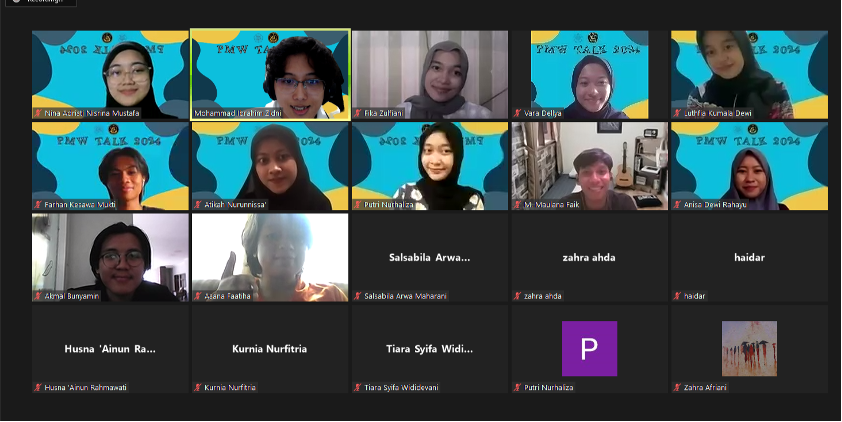

PMW Talk 2024 was conducted online through the Zoom Meeting platform with 2 speaker teams. The activities were divided into 2 sessions of material presentation and a Q&A session. In the first presentation session, the Kelore Team, consisting of Akmal Bunyamin, Anisa Dewi Rahayu, Atikah Nurunnisa’, and Farhan Kesawa Mukti, delivered the material. In the second presentation session, the Ecosekar Team, consisting of Fika Zulfiani, Azizah Khoirunnisa, Muhammad Khoirul Wafa, and Muhammad Maulana Faik, presented the material. The speakers provided an introduction to the activities, the flow, and the procedures of implementing the Student Entrepreneur Program (PMW), and shared their experiences and tips for participating in the program. This was followed by a discussion and Q&A session between participants and speakers regarding the presented material. More than 25 participants attended the PMW Talk 2024. Through this activity, biology students gained new knowledge from the speakers to develop their businesses through the Student Entrepreneur Program, fostering creativity, and motivating them to be more innovative.
[MBKM] – On Monday, 29 January 2024, as part of expanding partnership collaboration with potential industries in developing bioprospecting in Indonesia, the Research Team of the Independent Learning Independent Campus Program (Lit MBKM) from the Faculty of Biology UGM, led by Prof. Dr. Rarastoeti Pratiwi M.Sc., along with student members Abisha Yoofi Yudhatama, Dinny Kartika, Fatihatur Rizqiya Afifah, Lathifah Pinasti Putri, and Vincensia Yurin Prilia Kristanti, conducted an initial visit to CV. Madana Central Cosmetics (MCC) in Dalon, Sroyo, Jaten, Karanganyar, Central Java. The visit was received directly by the CEO of CV MCC, Purwo Harigung Nugroho, A.Md., along with managerial and Research and Development (R&D) staff.
During the discussion, the importance of collaboration in supporting Indonesia’s self-reliance, especially in cosmetics, by utilizing biological resources and human resources to face the intense marketing of cosmetic products from abroad, was emphasized. The need for the government’s role in creating policies that can protect domestic products to compete with imported products was also highlighted. The partnership collaboration between CV MCC and the Faculty of Biology at UGM was expected to result in product innovations, especially by incorporating natural raw materials, including plants that are easily grown in Indonesia, such as the butterfly pea plant (Clitoria ternatea L.). According to Purwo Harigung, “this collaboration is not only related to product innovation through research but can extend to a broader market by building systems starting from legal aspects (BPOM), branding, and promotion.” The meeting also showcased the types of cosmetics produced and developed by CV MCC, including soap, lotion, masks, and facial moisturizers. From the discussion with R&D, it was agreed to attempt product innovation by utilizing butterfly pea flowers, which have been extensively studied for their phytochemical content and have abilities such as being anti-bacterial, anti-inflammatory, antioxidant, and UV protection. MCC cosmetic company already has formulations for cosmetic products using mostly imported raw materials.
Simultaneously with the visit, a Memorandum of Understanding (MoU) was signed between the Faculty of Biology UGM and CV Madana Central Cosmetics. In addition, a Letter of Cooperation was also approved in the MBKM Research Program for 2024, led by Prof. Rarastoeti Pratiwi and Purwo Harigung Nugroho, A.Md. This collaboration was expected to be expanded and enhanced for the next five years. The visit concluded with an exchange of souvenirs, including a package of one of CV Madana Central Cosmetics’ products, namely the Plan6 Skin Bliss Box, and butterfly pea plant seeds from the MBKM Research Team. This activity also supports one of the Sustainable Development Goals (SDGs), specifically on Responsible Consumption and Production (SDGs 12).
Yogyakarta, 29 January 2024 – Faculty of Biology UGM held training entitled “Transmitted Light Microscopy” guided by Prof. Jorge H. Aigla, M.D. from St. John College, New Mexico, United States who attended along with Sureena Pohsa from Thailand as a research assistant. The training was carried out via hybrid in the Teaching Laboratory, Building B, Faculty of Biology, Gadjah Mada University and via zoom meeting, which was attended by lecturers, laboratory staff, students, and several high school teachers in Yogyakarta.
This activity was opened by the moderator, Tyas Ikhsan Hikmawan, M.S., Ph.D. which was continued with remarks from the Vice Dean for Research, Community Service, Collaboration and Alumni Affairs, Dr. Eko Agus Suyono, M.App.Sc.
“The microscope is one of the vital laboratory tools used in biological research, so it is hoped that this training can enhance participants’ experience and abilities in using this tool,” said Dr. Eko in his speech, Monday (29/01). He also expressed his welcome greeting to Prof. Jorge and Sureena as speakers at the training.
Prof. Jorge started the training with material related to the basics of using a microscope and the important aspects of using it to produce high quality image data. Aspects such as magnification, resolution (image detail) and contrast are crucial points for getting maximum object capture. Prof. Jorge emphasized that the use of a microscope must maximize the function of each part, such as the use of the objective lens, ocular lens, condenser and so on to minimize errors and less than optimal final results.
In the next session, Prof. Jorge guides the practice of observing at various magnifications including the use of oil immersion in high magnification observations. He emphasized again that the use of a microscope is basic, especially for biological research, but often basic knowledge such as recognizing lens types and their functions is not given enough attention.
This training is expected to provide comprehensive understanding and experience for participants, especially to improve laboratory and research skills. This activity is also part of the Faculty of Biology’s contribution to sustainable development goals (Sustainable Development Program; SDGs) especially in the development of inclusive education (SDG 4) through sustainable collaboration and cooperation (SDG 17).
On Thursday, 25 January 2024, a Waste Sorting Workshop titled “Conscious Sorting and Processing of Waste at Home (SAIDAH SARIMAH)” was conducted in collaboration between the Volunteer Independence Companions, the Yatim Mandiri institution, Bumi Sembada Waste Bank, and the Faculty of Biology UGM at Internet Learning Cafe Timoho from 09:00 AM to 12:00 PM WIB and was attended by students and staff from Yatim Mandiri Institution. The workshop’s content was delivered by Dzikri Asyakrullah, S.Sos, M.A., as an Empowerment Practitioner, Ria Karyanto, S.Kom, Founder of Bumi Sembada Waste Bank, Wahyu Aristianing Putri, M.Sc., Ph.D., and Novita Yustinadiar, S.Si., M.Si., as faculty members of the Faculty of Biology UGM. The workshop covered the importance of an empowerment mindset in addressing waste issues, the best practices and track record of the Bumi Sembada Waste Bank Sleman, community service discussing the synergy between academics and practitioners with the implementation of composting and biopore creation.
This time, Yatim Mandiri institution innovatively provided assistance in the form of community empowerment programs, aiming for a more significant impact through collaboration with practitioners and academics to address waste issues together with Bumi Sembada Waste Bank. This activity aligns with the PKM-MBKM and Desa Mitra programs that will be implemented by the Faculty of Biology in 2024, with the hope that many villages will become partners with Bumi Sembada Waste Bank. The Bumi Sembada Waste Bank was established in 2023 and was located in Sukoharjo Village, Padukuhan Besi, Sleman. There were 75 categories of waste that the community can sell to the waste bank, aiming to motivate the community to sort waste more diligently, thereby improving the economy and helping to address waste problems. Mr. Zikri outlined seven stages of community development, 1. Preparation: Aligning visions and missions, 2. Assessment, 3. Planning alternative activities, 4. Formulating action plans, 5. Implementing activities, 6. Evaluation, 7. Termination. It was emphasized that there should be involvement, participation, and clear role distribution in an empowerment organization, involving ideas from all members to ensure consistency in community service tasks. The outcome of this activity was the initiation of collaboration among all parties involved in waste bank distribution and the creation of a Zero Waste Management guidebook to be shared with partner villages.
This collaboration initiative was a contribution from the Faculty of Biology UGM to the goals of sustainable development (SDGs), specifically in the development of inclusive education (SDG 4) and sustainable cities and communities (SDG 11) through continuous collaboration and cooperation by building partnerships to achieve goals (SDG 17). Hopefully, this positive synergy can enhance healthy and prosperous living (SDG 3).

